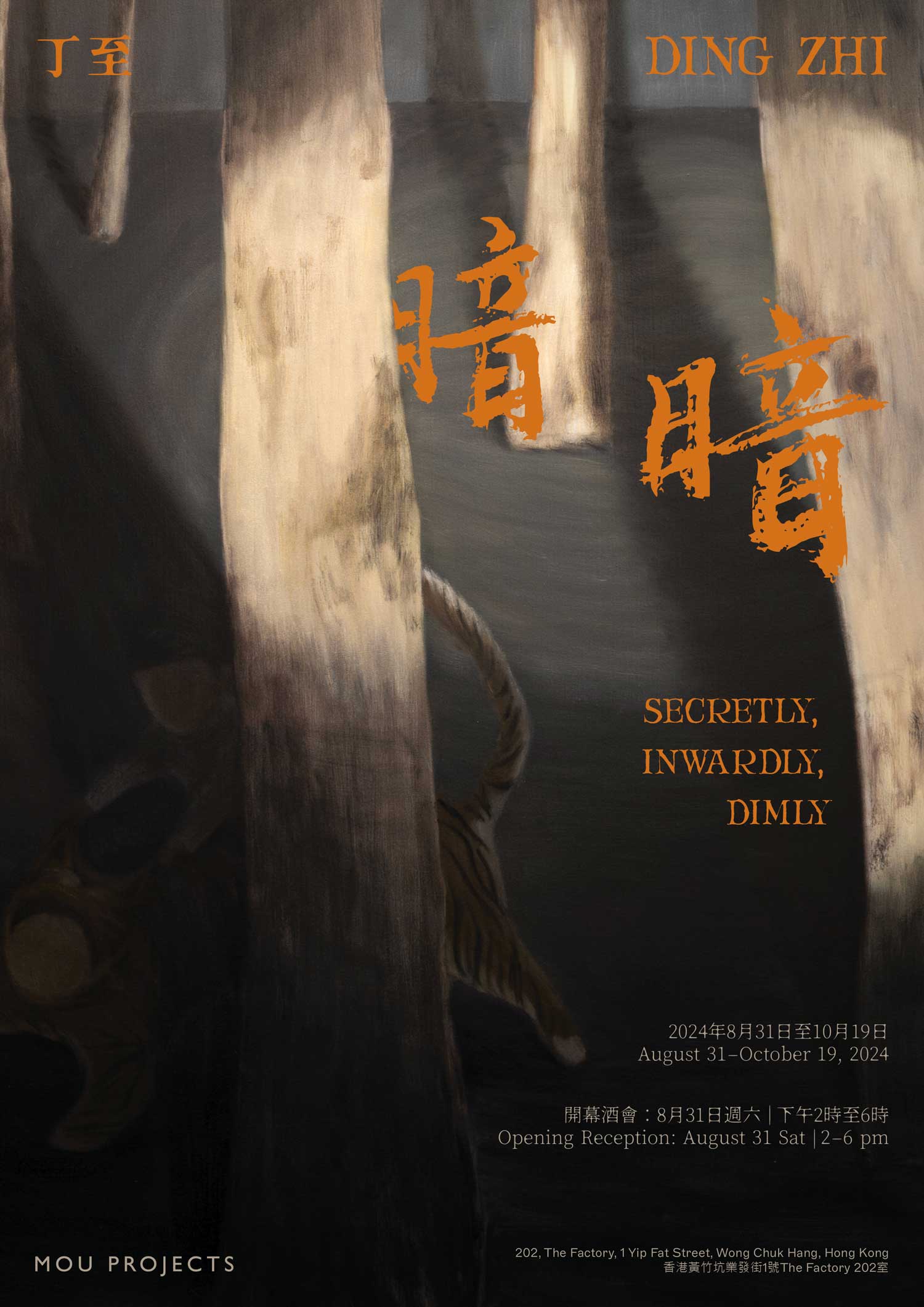MOU PROJECTS is pleased to present "Secretly, Inwardly, Dimly," Ding Zhi's first solo exhibition with the gallery as well as in Hong Kong. Showcasing a curated selection of most recent paintings, Ding merges personal history with a universal narrative in the featured works, encapsulating the essence of observing life from the shadows and the internal struggle of understanding one's place in the world. The exhibition's English title, composed of three peculiar adverbs, serves not just as a literal description of the spaces her painted characters inhabit but as a metaphor for the emotional and psychological landscapes they traverse. These adverbs—secretly, inwardly, and dimly—collectively sketch the contours of a deeply interior world, where actions and observations are cloaked in layers of discretion and introspection.
Ding's paintings are deeply imbued with her own life experiences, particularly her upbringing in Jiujiang, Jiangxi, China, and her subsequent immigration to the United States. Elements of magical realism found in her works speak volumes about the ordinary lives and life paths of people from small Chinese cities, articulated through a visual language that balances between cartoonish innocence and somber contemplation. Against backdrops of dark tones, the characters in her works exude a palpable sense of melancholy, underscoring the stark realities of ordinary living—harsh yet not devoid of hope.
Central to the exhibition are motifs that recur with symbolic intensity. The telescope, as seen in works like Dream Hunting (all works 2024) and Lurking series, is emblematic of the desire to observe from a distance, to be part of the world while also remaining apart from it. This duality speaks to Ding's own experiences as an immigrant and an observer, capturing the tension between longing and belonging, between the desire to engage and the instinct to retreat. The telescope as a motif also explores the dichotomy of visibility and invisibility, suggesting that what we choose to see and how we choose to see it can reveal as much about ourselves as it does about our subjects.
Elsewhere, the motif of riding a (fake) tiger beckons viewers into a realm infused with dreamland magic. An enigmatic symbol associated with deities in Chinese folklore, the act of riding a tiger embodies formidable power. However, in Ding's works, the illusion shatters as it becomes evident that the "tiger" is in fact a person in disguise. This startling revelation transforms scenes from her works into peculiar parodies, where the expected display of supernatural strength is undercut by a sense of theatrical absurdity. This motif echoes the story of her migration to the United States for education, funded by her parents' small business earnings. What felt like an empowering leap—"riding a tiger"—later revealed layers of self-discovery and the realization of entrenched roots in her humble beginnings. The tiger, once a symbol of her bold venture, is demystified as something much more relatable and human. The work Chana Star, with its reference to a van model popular among aspiring business owners in 2000s China, encapsulates this theme of aspiration versus reality. Against passing scenery in a window frame, the stationary tiger, mistaken for motion, parallels the artist's personal revelations about her journey, where perceived advances may be mere static views. Similarly, Come Prepared depicts a scene of anticipatory confrontation, and A Fish That Escaped the Net I visualizes the protagonist's elusion from capture. These allegorical scenes bring to the forefront themes of ambition, self-revelation, and the nuanced dance between power and vulnerability.
In Ding's works, characters are often found in moments of concealment or transition, marked by introspection and a search for belonging. "Secretly, Inwardly, Dimly" culminates as a profoundly personal yet universally resonant exploration of human existence. Through the lens of the artist's experiences and observations, the exhibition unfolds as a narrative tapestry weaving together themes of observation and concealment, strength and vulnerability, reality and illusion. Her works, interweaving realism and fantasy, invite viewers into a world where the lines between the seen and unseen, the external and internal, are both defined and blurred. In this space, we're encouraged to reflect on our own lives, on the moments of observation and participation, on the dreams hunted and the tigers ridden, real or otherwise.

